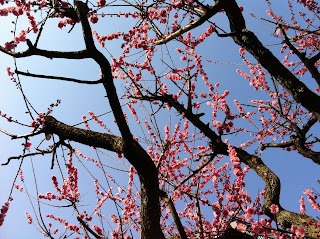It’s a funny thing about time.
Time slows down in waiting rooms and train stations.
On hot summer days, time drips like molasses.
So it goes when we’re uncomfortable, when we want something to be over, or when we focus on what we lack.
One motion becomes one hundred movements.
The second-hand on the clock moves in lead-heavy strokes.
There’s a visible pause between the back and the forth of a fan.
Remember that these are the little moments.
Let them drip-tick-tock.
Let them let you breathe and appreciate.
When we want something deeply, time lengthens so we have an opportunity to reach for it.
* * *
When I think of time, I think of the seasons.
The seasons are so integral to Japanese culture. With this connection comes a perpetual celebration of change, an awareness of the temporary, and a respect for the old. Every season has its special fruits, meals, activities, clothing, and festivals. It’s been like this for centuries.
I notice the passage of time more in Japan.
Perhaps because it’s all so continuously new…
Perhaps because I’m getting older…
* * *
Now it’s summer again in Kanazawa, nearly one year after my arrival.
I constantly feel time. Slowing down. Speeding up.
I thought winter would never end, but now the cold summer noodles I used to eat are back in the grocery stores.
Walking home from school at night, I am once again enveloped by the swell of cricket songs and the hot, humid air.
I remember how that air hugged me when I arrived last summer.
I see the change in my students.
Yuka can now count to 20.
Ayu is wearing makeup.
Hiroyuki speaks fluidly about his dreams for the future.
I see the change in me.
I am more patient.
I am more open-minded.
I have let go.
I have discovered that, like time, life unfolds however one chooses to perceive it.
There is no lack in my life.
There is no waiting for something to be over or for something else to begin.
I inhale all experiences—feel them pulse through my body.
Receive them with gratitude.
Appreciate them.
Share them.
The concept of time…a year, two years, ten years, fast, slow…fluctuates with thought. But every moment is always a perfect moment.
* * * the beginning * * *










































